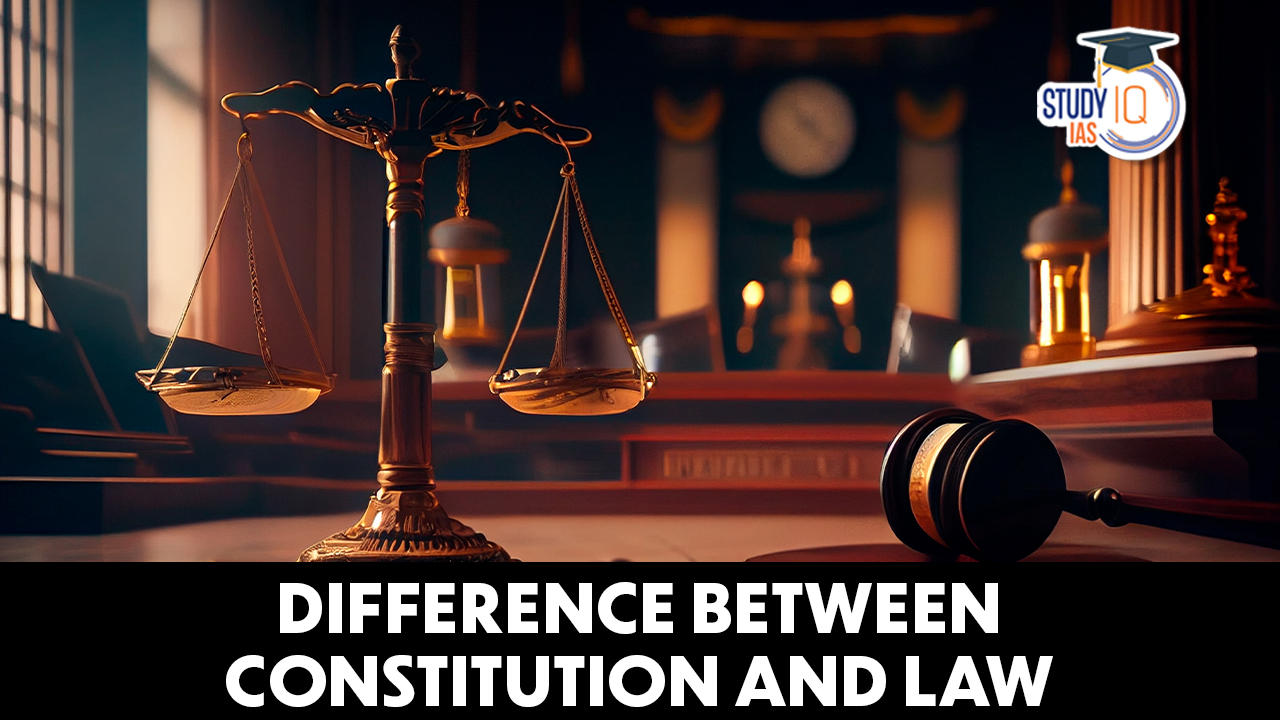Table of Contents
Difference Between Constitution and Law
Difference Between Constitution and Law: In the realm of governance and legal systems, the terms “constitution” and “law” are often used interchangeably, leading to confusion about their distinct roles and functions. To gain a comprehensive understanding of how these two elements i.e., Constitution and Law shape a nation’s legal framework and uphold its governance, it is imperative to explore the nuanced differences between a “constitution” and “law.” In this article, we delve into the fundamental difference between Constitution and Law which are two pillars of a country’s legal structure, shedding light on their unique roles and significance in maintaining a just and orderly society.
What is Constitution?
A constitution is a fundamental and supreme legal document that lays out the basic principles, framework, and structure of a country’s governance. It defines the powers and functions of various institutions, establishes the rights and responsibilities of citizens, and serves as the cornerstone of a nation’s legal system.
What is Law?
The law refers to a set of rules and regulations established by a governing authority, such as the state or a legislative body, to govern the conduct of individuals, organizations, and institutions within a society. It provides a framework for maintaining order, resolving disputes, and upholding justice, ensuring harmony and coherence in the functioning of society.
Major Difference Between Constitution and Law
The major difference between Constitution and Law lies in their nature, scope, and purpose. Here is a comprehensive table that gives the difference between these two terms in multiple aspects.
| Aspect | Constitution | Law |
| Definition | A supreme legal document that establishes the framework for governance, outlines the structure of the government, defines the fundamental rights of citizens, and sets the principles and values of a nation. | A set of rules and regulations enacted by the legislative bodies or authorities to govern and regulate various aspects of society, ensuring order, justice, and the protection of rights. |
| Scope | It lays down the fundamental principles and framework of a country’s political system, including the organization of the government, distribution of powers, and protection of citizens’ rights. | It focuses on specific issues, disputes, and societal matters, such as criminal law, civil law, contract law, labor law, and environmental law. |
| Hierarchy | The constitution holds the highest legal authority in a country and prevails over all other laws, including statutory laws and common laws. | Laws are subject to the Constitution and must not contradict its provisions; otherwise, they can be deemed unconstitutional and invalidated by the courts. |
| Amendment | Constitutions are relatively difficult to amend and usually require a special procedure, such as a constitutional amendment process, involving a significant majority in the legislative body or a referendum. | Laws can be amended more easily through the ordinary legislative process, with amendments proposed, debated, and voted upon by lawmakers. |
| Permanence | Constitutions are intended to be enduring and provide stability to the legal system, often standing for long periods without frequent changes. | Laws may change more frequently as societal needs evolve, and new legislation is introduced to address emerging issues. |
| Flexibility | While constitutions establish the fundamental framework, they are generally broad and flexible enough to adapt to changing circumstances and interpretations over time. | Laws can be more specific and flexible in addressing immediate issues, allowing for timely adjustments and fine-tuning as needed. |
| Source of Authority | The authority of the constitution is derived from the will of the people or through a constituent assembly, symbolizing the collective agreement of the citizens. | Laws derive their authority from the legislative bodies or authorities responsible for enacting and implementing them, acting as agents of the government. |
| Examples | Examples of constitutions include the Constitution of the United States, the Indian Constitution, and the Constitution of South Africa. | Examples of laws include the Criminal Code, Labor Laws, Environmental Protection Act, and Contract Law. |
Difference Between Constitution and Law UPSC
The understanding of the fundamental difference between Constitution and Law holds paramount importance for UPSC aspirants as it falls under the Indian Polity section of the UPSC Syllabus. Aspirants can gain valuable insights into the core principles that define a nation’s governance, legal framework, and protection of citizen rights. Familiarity with this topic is vital to excel in UPSC exams and can be achieved through comprehensive study materials, UPSC Online Coaching, and regular practice of UPSC Mock Test. A clear grasp of the nuances between a constitution as the supreme legal document and laws as specific regulations is essential for addressing questions related to constitutional provisions, legal amendments, and the balance between constitutional principles and legislative enactments.
























 WhatsApp
WhatsApp